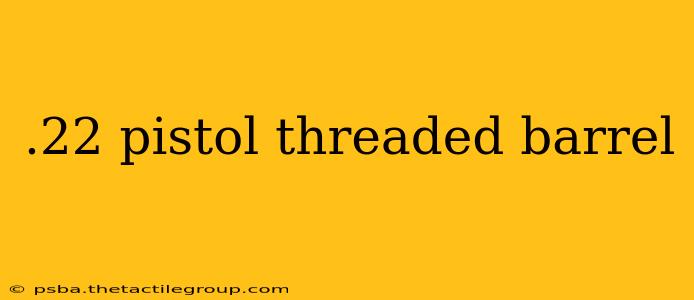The popularity of .22 pistols has surged in recent years, driven by their affordability, versatility, and ease of use. Adding a threaded barrel to your .22 pistol opens up a world of possibilities, from enhanced accuracy to the ability to add suppressors for quieter shooting. However, choosing the right threaded barrel and understanding its implications is crucial. This guide dives deep into the world of .22 pistol threaded barrels, covering everything from selection to legal considerations.
Why Choose a Threaded Barrel for Your .22 Pistol?
A threaded barrel offers several advantages for .22 pistol owners:
-
Suppressor Compatibility: This is the most common reason. A threaded barrel allows you to attach a suppressor, significantly reducing the noise and recoil of your firearm. This is beneficial for both recreational shooting and self-defense situations where reduced noise is paramount.
-
Improved Accuracy: While not always the case, a high-quality threaded barrel can sometimes improve accuracy by providing a more consistent point of impact. This is due to the tighter tolerances and manufacturing processes often employed in threaded barrel production.
-
Customization: A threaded barrel allows for greater customization of your pistol. Beyond suppressors, you can attach muzzle brakes, compensators, or flash hiders, each offering different performance benefits.
-
Increased Resale Value: A threaded barrel can add value to your firearm, making it more appealing to potential buyers.
Choosing the Right Threaded Barrel: Key Considerations
Selecting the correct threaded barrel is essential for both performance and safety. Here’s what you need to consider:
Caliber:
This might seem obvious, but ensure the threaded barrel is specifically designed for your .22 caliber pistol. Using an incorrect caliber barrel is extremely dangerous.
Thread Pitch:
Different manufacturers use different thread pitches (the distance between threads). Common thread pitches include 1/2x28 and M9x1. Make sure the thread pitch of your barrel matches the thread pitch of your suppressor or other muzzle device. Incorrect thread pitch can lead to damage or injury.
Barrel Material:
Threaded barrels are typically made from steel or stainless steel. Stainless steel offers superior corrosion resistance, making it a preferred choice for many shooters.
Barrel Length:
The length of the barrel will affect the velocity of your projectiles. Shorter barrels generally result in lower velocities, while longer barrels generally produce higher velocities. Consider your intended use and the legal restrictions in your area regarding barrel length.
Manufacturer Reputation:
Choosing a reputable manufacturer is crucial. Look for companies with a proven track record of producing high-quality, safe firearms components.
Legal Considerations and Safety Precautions
Before purchasing and installing a threaded barrel, it's vital to understand the legal ramifications:
-
Federal Regulations: In the United States, the legality of suppressors is governed by federal law. You must obtain a tax stamp and comply with all relevant regulations before owning or using a suppressor.
-
State and Local Laws: State and local laws can vary significantly regarding suppressors and firearm modifications. Research your local laws before purchasing a threaded barrel or suppressor.
-
Safe Handling: Always follow safe firearm handling practices. Never point a firearm at anything you are not willing to destroy. Ensure the pistol is unloaded before installing or removing the threaded barrel.
Conclusion: Enhancing Your .22 Pistol Experience
A threaded barrel can significantly enhance your .22 pistol shooting experience, providing opportunities for customization and performance improvements. However, careful consideration of compatibility, legality, and safety is paramount. By understanding the factors outlined above and conducting thorough research, you can confidently choose and install a threaded barrel that meets your needs and ensures safe and enjoyable shooting.

